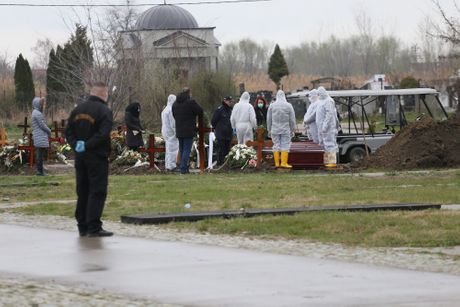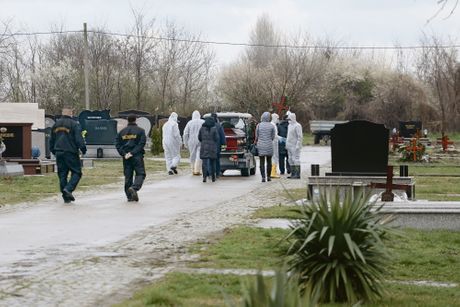Funerals in Serbia in the time of coronavirus: Bodies of victims placed in 3 layers before burial

A 59-year-old man from the town of Kikinda, the first victim of coronavirus in Serbia, was laid to rest on Wednesday under the new rules: there were only a handful of people allowed to see him to his final resting place, funeral parlor workers wore protective disposable suits, masks, gloves, and boots; and the chapel at the Kikinda Cemetery was disinfected beforehand.
The man's own daughter, son, and wife weren't among the mourners, though: that's because they had to stay at home, in isolation.
These new measures are being widely respected in cemeteries, as the coronavirus outbreak affects Serbia.
One day before the funeral, Branka Zivaljevic, the head of the Kikinda Cemetery Service public enterprise, announced the company had taken all the necessary measures.
"The funeral will be carried out by our workers who wear masks, protective suits and gloves, and we disinfected the chapel," she explained.
The official website of the Kikinda Public Company also states that the City Emergency HQ has issued a decision prescribing a restriction on the number of people allowed to attend any funeral to ten.
The director of the Belgrade Cemeteries public company, Dragan Baltovski, told Telegraf.rs that, according to the Batut Institute of Public Health - the treatment of the burials of those who died from coronavirus infection is the same as that of those who had the flu.
"A person who dies from coronavirus cannot spread the infection, but we are more cautious in preventing some unintended consequences. (Workers) wear disposable suits, masks, gloves, everything, as protective measures," says Baltovski.
Video: In Italy, its hard to bury the dead in a timely manner; a church is filled with coffins
He also stressed that family members of a deceased person are advised not to attend the funeral if they happen to be 65 or older.
"Also, do not offer your condolences in the usual way - no handshakes, no embraces... as well as, people should be wearing masks and gloves. There can be 5 to 10 people outdoors, and mostly that is so. The attendance of people at funerals has been reduced, our lives have changed, and even in this domain - as we bid goodbye to our loved ones," he points out.
According to Igor Jovanic, the director of the New Cemetery in the city of Nis, the public company Gorica employees involved in funeral activities adhere to all the measures adopted by the government of the Republic of Serbia and recommendations made by the Crisis HQ of the City of Nis.
"At this time we have protective equipment, we also have masks and gloves. We also use these outside of emergency situations, because of the sensitivity of our activities," says our interlocutor, adding that a new contingent of protective gear had arrived just yesterday.
He also said that the mortality rate has not been higher during this period.

"As for the persons who died from coronavirus - we've had a protocol and instructions before on how to treat the deceased, that is, the bodies arriving from the Clinic for Infectious Diseases. None of this is new to us, there are other infectious diseases, not just coronavirus," he said, and continued:
"The deceased person is placed in a certain, so-called PVC bag, then into a tin casket which is sealed, and then into a wood casket. Then, the disinfection is carried out, and then the family can bury them."
As Jovanic points out, the company can now recommend that when someone plans a funeral, they shouldn't gather a large number of people but stick only to the immediate family.
"Residents of Nis facing difficult times, as they are saying goodbye to their loved ones, very strictly respect these measures. My window overlooks the chapel, that's how my office is positioned. For days, I've been looking at one priest, a couple of people attending a funeral, one carrying the (wooden) cross, another the flowers, there are 4 gravediggers - and it all looks horrid. But people are aware of the situation, and there is also courage in this - to act maturely and heroically in situations like this one. We must be careful," says Jovanic.
VIDEO: People fight in supermarkets around the world; Meanwhile, in Serbia:
(D. Simic)
Video: Novinar Telegrafa "svat" na grčkoj svadbi: Oficiri nevestu svog kolege dočekali zveketom mačeva
Telegraf.rs zadržava sva prava nad sadržajem. Za preuzimanje sadržaja pogledajte uputstva na stranici Uslovi korišćenja.

